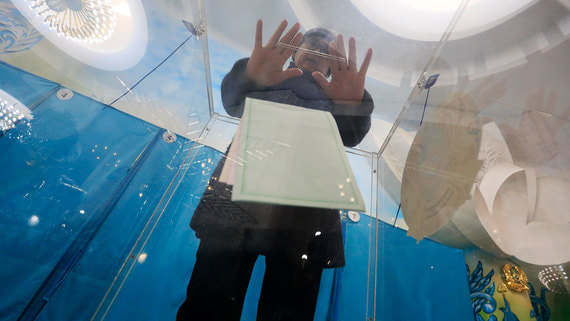Renewed ruling party wins elections in Kazakhstan
[ad_1]

According to the preliminary results of the elections to the Mazhilis (lower house) of the Parliament of Kazakhstan, the ruling Amanat party is in the lead with 53.46% of the votes, according to data exit polls of the Institute of Eurasian Integration. The official results of the elections by the Central Election Commission of the republic have not yet been announced. But, according to his latest data, the turnout was 54.19% (last time it was at the level of 63.3%).
In the 2021 elections, the ruling party, then known as Nur Otan, won 71.1%.
The current results of the ruling party were expected. A poll conducted by the Public Opinion Center on March 3-10 showed that 66.7% of respondents were ready to vote for the ruling Amanat party. The necessary threshold of 5% of the vote, according to the poll, was also overcome by the parties “Auyl” – 6.1%, “Republic” – 5.4%, “Ak Zhol” – 5.2%, People’s Party – 5.1%.
The Green Party, according to the poll, did not overcome the barrier. The results of the distribution of votes, judging by the exit poll, will roughly correspond to sociological measurements. At the same time, the National Social-Democratic Party can still get into the parliament of Kazakhstan.
Before these elections, for the first time in many years, the electoral system in Kazakhstan was changed. Over the past 18 years, all 100% of deputies were elected from lists. Now 70% of the deputies of the Majilis are elected from party lists, and 30% from single-mandate constituencies.
In addition, before this campaign, the procedure for registering parties was simplified – the registration threshold was reduced by 4 times, from 20,000 to 5,000 members, the minimum number of regional representations of parties was reduced from 600 to 200 people.
Elections to the Mazhilis of Kazakhstan preceded early presidential elections on November 20, 2022, in which President Tokayev won with 81.3%.
In addition, the members of the Senate were replaced – they are elected by electors from the regions, and some are appointed by the president. On January 12, the first president of the country, Nursultan Nazarbayev, was deprived of the status of an honorary senator, and even earlier, in December 2022, a bill was sent to the Majilis to deprive him of his special status and to remove the corresponding clause from the constitution.
The January events of 2022 revealed the crisis of political elites, acute socio-economic problems, the low ability of the system to cope with waves of minor crises, says Daria Chizhova, director of the Information and Analytical Center for the Study of Socio-Political Processes in the Post-Soviet Space. Therefore, early parliamentary elections should consolidate the renewal of the elites and once again legitimize the power of Tokayev and his team, as well as let off steam of social discontent, the expert explains.
The constitutional reform allowed the emergence of two new forces – environmentalists and the “Republic”, the latter’s supporters are entrepreneurs, Chizhova notes. This made it possible to revive the party field and the socio-political discussion, so that the authorities could get a sociological cut of moods, the expert believes.
A Vedomosti source familiar with the organization of elections in Kazakhstan notes that the changes in the country’s political landscape are more of a cosmetic nature. According to him, the reduction of registration requirements for parties has added external diversity. But both new parties – both the Greens and the Republic – are associated with the authorities. There was no really serious revision of the political system, the source says.
The main innovation was the election of 30% of the Mazhilis in single-mandate constituencies – a return to this norm should increase interest in the elections. In some regions, a huge number of candidates appeared in single-member districts – from 80 to 100 people per seat. This really demonstrates some revival of the electoral process, but it has little to do with real democracy, says a Vedomosti source, and besides, there are no real oppositionists among them. At the same time, 30% of single-mandate deputies are a minority in the Majilis, he notes.
Quite noticeable changes have taken place in the political system of Kazakhstan, but they cannot be called cardinal, Andrey Kazantsev, doctor of political sciences, believes. Observers could still easily predict the main winner – the redesigned ruling party “Amanat”, but not all the final hands. The popularity of the ruling party is indeed very high, including by maintaining dominance in the information sphere and management, Kazantsev believes. In Kazakhstan, it has not been possible to create a serious alternative to it, although such attempts have been made by the opposition, the expert says. Compared to the Nazarbayev system, people in Kazakhstan have become more free to engage in political discussions, but this does not pose a challenge to the presidential administration, Kazantsev concludes.
[ad_2]
Source link








